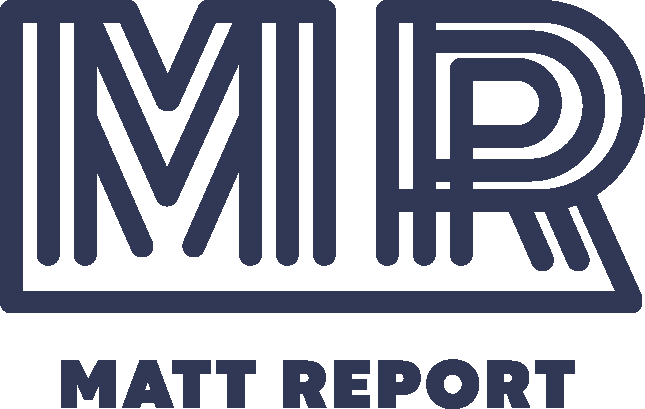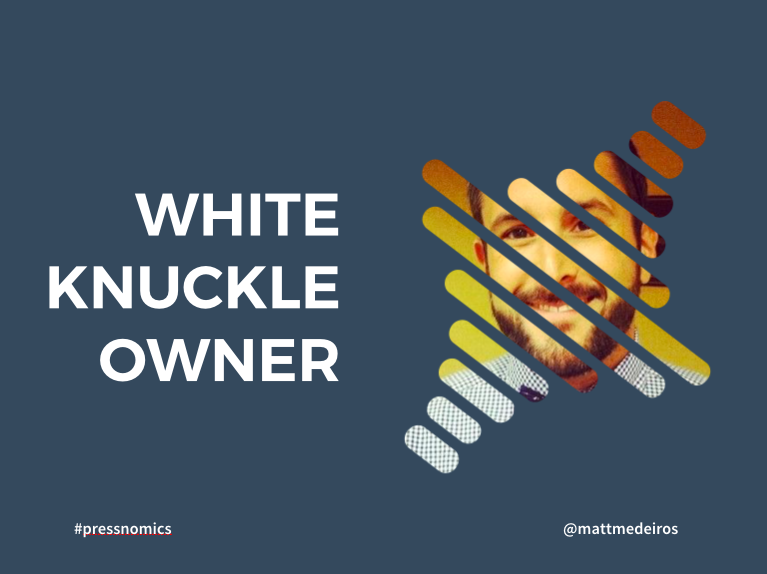Here are slides and monologue for my PressNomics 4 presentation.
Slides
Monologue
Hello everyone, thanks for coming out to the second to last session of this amazing event. Boy, do I feel special. I mean, who else can secure the second_to_last_spot at PressNomics?
Honestly, I thought that I’d be headlining, but somehow Cory Miller got the job. Smooth talking, sexy looking Cory-freaking-Miller. Ugh!
No idea why. I mean, so what — he’s built a 7-figure business, millions in revenue, 20+ employees and just rolled out a product update that everyone loves — BackupBuddy.
Aren’t I just as cool as him? Aren’t MY products just as sought-after? Can’t I achieve the same “fame?”
Let’s look at some facts:
- We both started in 2008. Check.
- We’re both selling WordPress products. Check.
- We both have an audience of freelancers/entrepreneurs. Check.
- We both have a great Southern drawl. Hmm…maybe not…
I’m doing everything right. I’m doing what “they” told me to do:
- Build a product — run from the services side of business.
- Make money while you sleep.
- Grow an audience, build trust, and the sales will come.
In late 2014 we launched a product called Conductor Plugin. We were scratching our own itch, developing a useful plugin that served as a “builder framework” for the custom WordPress sites we were producing. Customers wanted drag-n-drop and we didn’t want to use traditional, bloated, page builders on the market.
So we built up an advisory team of influential WordPress people and forged ahead with pitching, testing, and getting to our 1.0 launch.
Long story short: on the opening up for sale we sold $4,000 worth of licenses — IN THE FIRST HOUR.
Where’s my Porsche? Or at the very least, my S7…
For the following month — the entire rest of the month — it grossed: $857.
I’ll stick with my 2007 Passat Wagon.
At the end of 2015 Conductor Plugin has grossed just over $30,000 in total license sales.
Now, let’s put that into perspective: To some of you that would be a welcome result to launching your first product — to other’s…not so much. Even more so, when you begin comparing yourself to other products/businesses in the market:
- Pippin Williamson: $700k+
- Ionut of Theme Isle: $80k+/month
- Avada theme: $1 Billion dollars a week*
Fucking-A! What about me?!
There’s a few lessons here that I’d like to break-out from my product journey:
Lesson 1: Settle within your strengths.
We’re an agency too. In fact, it’s where we get 80% of our revenue. Even a 10% increase in product sales means we don’t have to manage 10% of client work. Incremental growth is still growth.
I’m not a designer or developer. A lot of my peers, a lot of you, are actually able to do the work. I need to pay for it. You might be in this situation too.
Be honest: Our product wasn’t purpose-built to a market need. We didn’t set out to execute market research to fill a market need. We would have still matured Conductor for our own needs, regardless if it became a hit or not.
So at the end of the day, we have to make sacrifices and often it comes at the detriment of product growth. If this was — easy — everyone would be doing it. And my point of this is, we’re not diverting from our core competencies. We’re building a product we know in and out and can sell the value of it more organically.
Lesson 2: Don’t compare your beginning to someone else’ middle
Why am I not as good as him? Why am I not as popular as her? Where is the revenue like them?
We live in a bubble. We have our Twitter following, we go to events like this, and we’re constantly consuming at success headlines.
“How I created a six-figure RECURRING revenue business”
Yea, I fucking did that too, it’s called building websites for people. And actually, it’s more like teaching people how to use the internet than anything else.
But we see these headlines and we make them our goals. Then we try to reverse engineer them grabbing at crumbs of lessons along the way, trying to put them altogether to formulate some form of track to success.
You might think that these product developers or web marketers are going home and doing a nose-dive into their pool of money — but a majority aren’t.
If you’re NOT questioning the work you do, if you’re NOT finding friction, then something is wrong. I don’t care who you are or what success you’ve found, nothing worth building simply goes on autopilot. Nothing is as easy as people make it out to be.
Lesson 3: WordPress plugins meets traditional software business
Why am I not freaking the fuck out about my product sales versus my competitors in the room? When people say, how can you make real money selling a support license for $199 attached to a GPL codebase?
One advantage we have NOT being a high-volume seller is that we are still doing client work. By doing custom client work, we’re able to position Conductor as our unique advantage going into a project. We can see the features of our software and append a custom implementation fee on top of it.
Like Red Hat Linux — the OS is accessible for free, but the support license to enterprise costs over a million.
So while Conductor licenses are being sold passively, we’re also selling custom contracts for well into the five-figures to implement and support it.
I challenge you to think about that in your own business.
Car sales
Which leads me to my next story: growing up in car sales.
See, the reason why you have to embrace your strengths and your weaknesses is because we’re all different. Our situations are different. I run this business with my father — how many of you are running your business with a family member?
You think it’s going to look like this: Godfather
When it really looks like this: Griswolds
But, that said, it’s about feeling confident with the cards you’ve been dealt.
If I ever get around to writing a book, it’s going to be called: Everyone should start in car sales: A tactical guide on going to war with customers over price, features, and value.
At the time, car sales wasn’t much different than how we operate now:
- Customer relationships, great service, and trust
- Build a team like family
- Diversify income
When we were in business, the consumer internet was just starting. Once people could actually price shop online, it changed everything. This is exactly how it is today:
- Companies send out RFP’s to 40 different agencies and kick tires.
- Customers freak when they don’t get unlimited for $49
Lesson 1: You need to work to get the sale
Sales don’t come easy. You have to work for the sale. That’s it. There’s nothing more than that. Once you accept that, until you realize every deal is NOT final until you have the cash in the bank, then accepting the challenge is easier.
Lesson 2: Diversify and go where the customers are
Tell the story about NASCAR accessories
Why do I do all of this? Transparent audience building
A lot of you have great products, but a lot of you aren’t connecting with an audience. It might not matter now, or ever, but my long-game play is that people know & trust me. A lot of people don’t care and do very well in their businesses. Extremely well. But to me, connecting matters the most.
I am authentic. You’re not going to see shitty headlines or bogus LeadPages squeeze captures from me. Side note: LeadPages started a WordPress plugin and is not a multimillion dollar VC backed company. Fuck.
Probably, just like you, I want to know what WordPress is doing.
Why can’t we sell through the repo?
Why can’t was have our REST API?
Who’s running this ship?
Why did you start the Matt Report?
10up story.
Lesson 1: I use the accolades of Matt Report as a deal maker. Customers can learn more about me, actually listen to my approach on business etc. This is legitment sales tool/method I actually present to clients. “I have the #1 business WordPress podcast on iTunes”
Lesson 2: I’m building an audience. This is the real purpose of content marketing. Not just the conversions on your e-mail optin or total sales on a given month — but a trusted group of people that want to have real discussions in the space.
Lesson 3: Listener feedback, no matter how small my listener base is, that’s what matters most.
Here’s a final story before we go
Last week I was in one of the coffee shops I often work out of and I observe this guy walking in carrying a bunch of grocery bags, you know the type, they are like the re-usable cloth-like kind. He’s unkept, over weight, and unshaven. His pants are dark and dirty, something like at the end of shift for a short-order cook manning a fry-o-later.
He orders a fruit cup and shuffles to his table and sits amongst the waste of a couple that sat there before him. Dirty plates, cups, and crumpled up napkins. I want to tell the wait staff to clear the table, but the man starts eating his food — not moving any of the dirty plates away.
After about 45 seconds, I notice no one is coming to clear this table, which he as a customers deserves a right to. I walk over and ask him If I can clear the plates for him. He half looks ups at me, feverishly eating his fruit —
“Ah, it’s okay, I’m a slob too. It doesn’t matter that it’s not clean.”
I told him that it was not a problem and he shouldn’t have to eat at a dirty table. I cleaned the plates and he thanked me as I walked away.
What’s the moral of this story? The moral is that some of us
Side note: If you don’t think we’re all competing at some level, then you’re sadly mistaken.


Leave a Reply